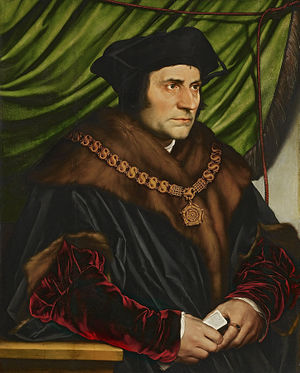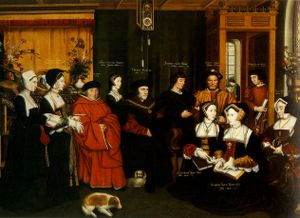Thomas More

Sir Thomas More (1478–1535), saint, statesman, scholar, and author, was an incarnation of El Morya, who had been Thomas Becket in a previous life. He served as Lord Chancellor of England under King Henry VIII, the reembodied Henry II. Once again they were given the choice to serve God’s will or man’s will.
More discharged his duties wisely and well, but was beheaded because he failed to support the king in his departure from the laws of the Church regarding his marriage to Ann Boleyn.
Early life
Celebrated today as “a man for all seasons,” Thomas More was born in 1478 in the heart of London. His father, a prominent lawyer and judge, provided him with an excellent education. At eighteen, he left Oxford with a thorough knowledge of the classics and devoted himself to the study of law.
Young Thomas was already a close friend of the eminent Dutch humanist Erasmus and was growing in favor with King Henry VIII, who employed him in missions abroad. Also pursuing his literary interests, More was acclaimed as the first writer of elegance in English prose for his Life of Richard III, a precise historical document which Shakespeare followed in literal detail.

More’s deep devotion to God caused him at one time to consider a religious vocation and to practice extraordinary austerities for over four years to test his own self-discipline. He decided to marry, however, and his wife and four children proved to be his greatest joy and his sole comfort in days to come. Their famed estate at Chelsea housed Thomas’ entire family, including eleven grandchildren. Over the years, More’s “little Utopia,” as he often called it, became a center of learning and culture, likened by Erasmus to “Plato’s academie”—a home of good will to which came the most learned men of the day, even the king himself, for counsel and for comfort. At Chelsea, More wrote the famous work entitled Utopia, a witty exposé of the superficiality of English life and the flagrant vices of English law.
In 1529, Sir Thomas More was appointed by Henry VIII Lord Chancellor of England. Of him Erasmus wrote: “In serious matters no man's advice is more prized, while if the king wishes to recreate himself, no man’s conversation is gayer. Often there are deep and intricate matters that demand a grave and prudent judge. More unravels them in such a way that he satisfies both sides.”
In spite of many honors and achievements, More sought no man’s esteem. He remained sensitive to the needs of the common people by daily walking the back streets of London to inquire into the lives of the poor. And even as Lord Chancellor, it was his daily custom to enter the court of judges at Westminster Hall where his father sat, to kneel, and to ask his blessing.

Conflict with the king
Sir Thomas devoted himself to his duties with utmost zeal until Henry, desirous of but lacking a male heir to the throne, declared his marriage to Catherine of Aragon null and announced his intent to marry Ann Boleyn. Since the divorce was without Papal approval and directly opposed to the laws of the Church, More refused to support the king’s decision. He resigned his office and retired to Chelsea where, greatly concerned with the heresies of Luther’s revolt, he continued his writings in defense of the Catholic faith.
Without friends and without office, More and his family lived in abject poverty. Nevertheless, Henry had been insulted at the chancellor’s public disapproval of him. The king, therefore, sought to defame More and thus restore his royal image. When Sir Thomas clearly refused to give the oath of supremacy to Henry as head of the new Church of England, he was imprisoned in the dread Tower of London. Badgered by king’s lawyers, More staunchly refused to compromise the position of the Church but diplomatically avoided direct accusation of the king, thereby saving his life and remaining a testimony to Henry’s sinful injustice.
Finally, however, jealous enemies were encouraged by Henry to lie against him in the chancellor’s own court at Westminster. Charged and convicted of high treason, Thomas More was beheaded on Tower Hill in 1535. Kneeling before the executioner, he said, “I die the king’s loyal subject but God's first.”
Legacy
Sir Thomas More was beatified by the Roman Catholic Church in 1886 and canonized in 1935.
More’s most famous work, Utopia, is an attempt to depict an ideal society, one in which men live in harmony under the holy will of the Most High God.
The motion picture based on the play by Robert Bolt, A Man For All Seasons, is the story of the life of Sir Thomas More.
An ironic footnote to this episode is that in 1538 Henry VIII had the shrine of Saint Thomas Becket broken to pieces. After so many centuries he had never forgiven Becket. Henry ordered Becket’s name erased from the prayer books and prohibited any images of Becket in England.
Sources
El Morya, The Chela and the Path: Keys to Soul Mastery in the Aquarian Age.
Elizabeth Clare Prophet, February 17, 1990.
